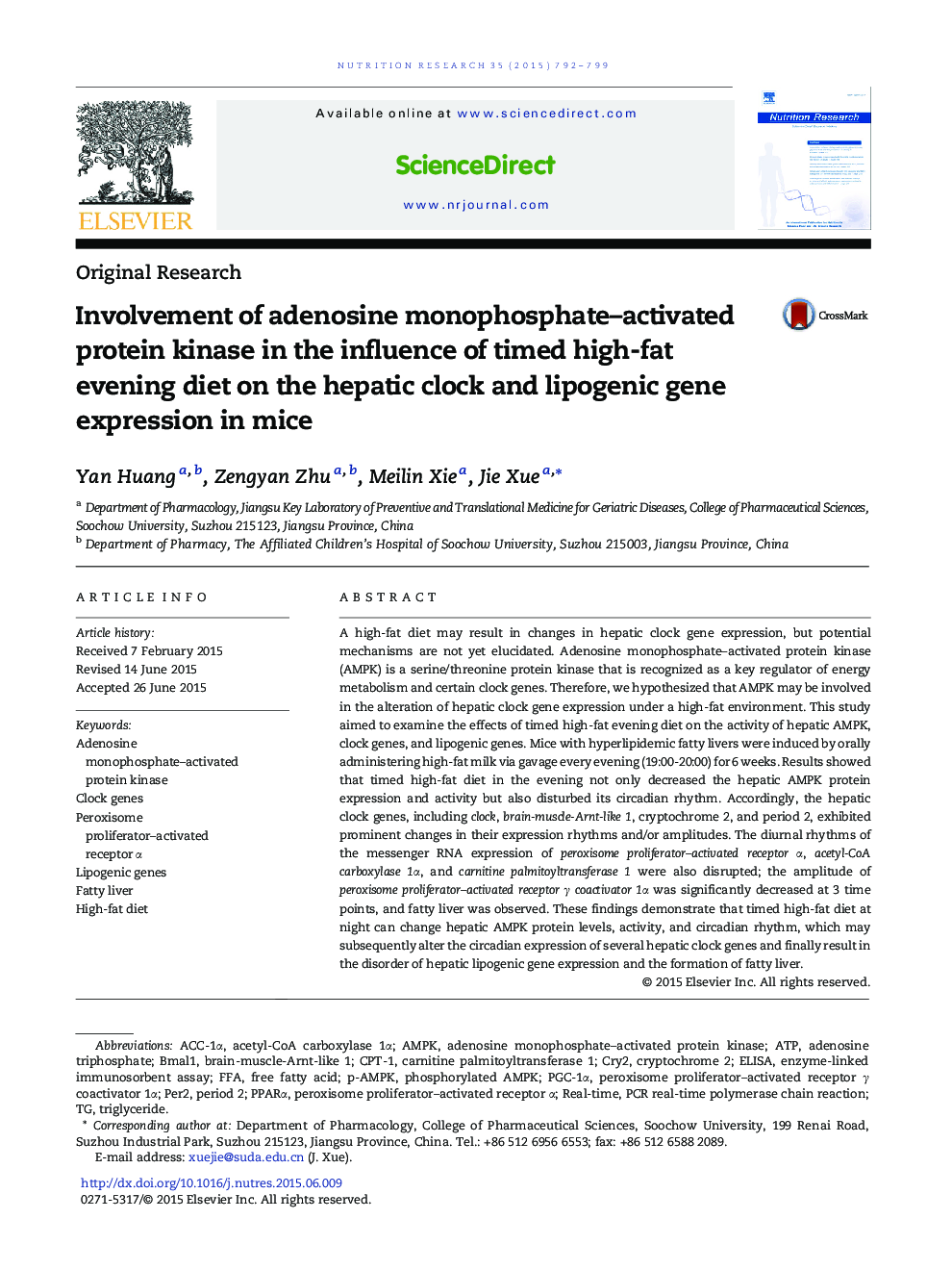| کد مقاله | کد نشریه | سال انتشار | مقاله انگلیسی | نسخه تمام متن |
|---|---|---|---|---|
| 5904422 | 1157997 | 2015 | 8 صفحه PDF | دانلود رایگان |
عنوان انگلیسی مقاله ISI
Involvement of adenosine monophosphate-activated protein kinase in the influence of timed high-fat evening diet on the hepatic clock and lipogenic gene expression in mice
ترجمه فارسی عنوان
مشارکت پروتئین کیناز فعال آدنوزین مونوفسفره در اثر زمان رژیم غذایی روزانه با چربی بالا بر روی ساعت کبدی و بیان ژن لیپوژنیک در موش
دانلود مقاله + سفارش ترجمه
دانلود مقاله ISI انگلیسی
رایگان برای ایرانیان
کلمات کلیدی
cryptochrome 2Cry2phosphorylated AMPKp-AMPKCPT-1FFAPGC-1αAMPKPPARαBmal1 - BMAL1Per2 - per2Adenosine Triphosphate - آدنوزین تری فسفاتATP - آدنوزین تری فسفات یا ATPadenosine monophosphate–activated protein kinase - آدنوزین مونوفسفات فعال پروتئین کینازFree fatty acid - اسید چرب آزادReal-time - بیدرنگ، بلادرنگ یا زمان واقعیtriglyceride - تریگلیسریدEnzyme-linked immunosorbent assay - تست الیزاELISA - تست الیزاPeriod 2 - دوره 2high-fat diet - رژیم غذایی با چربی بالاLipogenic genes - ژن های لیپوژنیکClock genes - ژنهای ساعتCarnitine palmitoyltransferase 1 - کارنتین پالمیتویل ترانسفراز 1Fatty liver - کبد چرب
موضوعات مرتبط
علوم زیستی و بیوفناوری
بیوشیمی، ژنتیک و زیست شناسی مولکولی
علوم غدد
چکیده انگلیسی
A high-fat diet may result in changes in hepatic clock gene expression, but potential mechanisms are not yet elucidated. Adenosine monophosphate-activated protein kinase (AMPK) is a serine/threonine protein kinase that is recognized as a key regulator of energy metabolism and certain clock genes. Therefore, we hypothesized that AMPK may be involved in the alteration of hepatic clock gene expression under a high-fat environment. This study aimed to examine the effects of timed high-fat evening diet on the activity of hepatic AMPK, clock genes, and lipogenic genes. Mice with hyperlipidemic fatty livers were induced by orally administering high-fat milk via gavage every evening (19:00-20:00) for 6 weeks. Results showed that timed high-fat diet in the evening not only decreased the hepatic AMPK protein expression and activity but also disturbed its circadian rhythm. Accordingly, the hepatic clock genes, including clock, brain-muscle-Arnt-like 1, cryptochrome 2, and period 2, exhibited prominent changes in their expression rhythms and/or amplitudes. The diurnal rhythms of the messenger RNA expression of peroxisome proliferator-activated receptor α, acetyl-CoA carboxylase 1α, and carnitine palmitoyltransferase 1 were also disrupted; the amplitude of peroxisome proliferator-activated receptor γ coactivator 1α was significantly decreased at 3 time points, and fatty liver was observed. These findings demonstrate that timed high-fat diet at night can change hepatic AMPK protein levels, activity, and circadian rhythm, which may subsequently alter the circadian expression of several hepatic clock genes and finally result in the disorder of hepatic lipogenic gene expression and the formation of fatty liver.
ناشر
Database: Elsevier - ScienceDirect (ساینس دایرکت)
Journal: Nutrition Research - Volume 35, Issue 9, September 2015, Pages 792-799
Journal: Nutrition Research - Volume 35, Issue 9, September 2015, Pages 792-799
نویسندگان
Yan Huang, Zengyan Zhu, Meilin Xie, Jie Xue,
